|Paris Architecture| Paris has always played an unique and trend-setting role in the story of French architecture. From Roman past to the present, Paris displays a fascinating multifaceted metropolis.
9 styles of Paris Architecture over time
The City of Lights offers 9 major styles over time : Antiquity to Middle ages, Renaissance and Baroque, Neo-Classicism, Historicism and Eclecticism, Art Nouveau, Classical Modernism, Postwar period, Postmodernism and the 1980s, current tendencies. For each of them, discover our selection of one amazing Paris sightseeing :
Antiquity to Middle Ages Paris Architecture (100 – 1532)
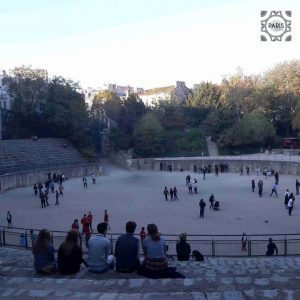
The arenas of Lutèce (old name of Paris from the Roman Empire 58 before Christ), built in the first century, are a Gallo-Roman amphitheater, for theatrical performances and for gladiator fights and other games with a capacity of 17 000 places (district 5). It is a great spot to enjoy with friends, family and kids. In this period, we can include Notre Dame Cathedral for its Gothic architecture, the Sainte Chapelle and Saint Denis Basilica.
Renaissance and Baroque (1547 – 1762)
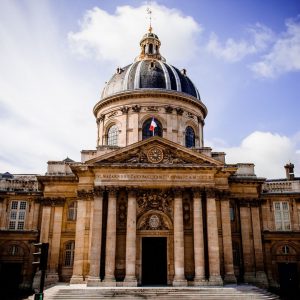
Cardinal Mazarin founded a college for 60 gentleman on March 6, 1661 (district 6). This structure facing the Louvre across the river is the dominant Baroque ensemble in the city. Napoleon installed the Institut de France in 1805. The Institut de France is a learned society, grouping five academies. In this period, we can include La Place des Vosges and Luxembourg Palace and garden.
Neo-Classicism Paris Architecture (1770 – 1808)
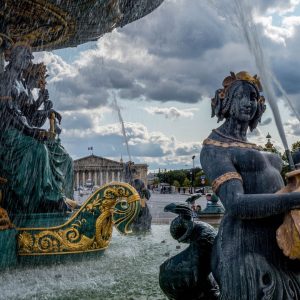
The Bourbon palace’s facade (district 7) offers an imposing view across the pont royal, through the obelisk at the center of place de la Concorde and its fountain to the La Madeleine church. Today it is the seat of the French National Assembly. It used to be the palace built for the legitimized granddaughter of King Louis XIV in the shape of a Greek temple. In this period, we can include La Madeleine church facade and Odeon Theater.
Historicism and Eclecticism (1826 – 1899)

The passage Jouffroy and Passage Verdeau (district 9), those two arcades among many others panoramas were popular attractions. They are offering café and restaurant, art galleries, little boutiques mostly of handcrafts. Their architecture is typically from the 19th century Paris with very high iron and glass ceiling. Built in 1847, its walls are adorned with geometric patterns and an ancestral clock, giving it a quintessentially Parisian charm. In this period, we can include Opéra Garnier and Fountain of Place Saint Michel. Above all, the Eiffel Tower.
Art Nouveau Paris Architecture (1895 – 1914)

In 1896 right before the World’s Fair of 1900, the city of Paris and the French government agreed to build 6 underground rail lines. The architect Guimard merged Viollet Le Duc rationalism with modern, functional and artistic appearance. By 1914, the metro network included 10 lines with a total of 141 pavilions and unroofed entrances designed by Guimard. In this period, we can include the synagogue rue Pavée in Le Marais and the department store La Samaritaine. In addition, amazing buildings reflect the Art Nouveau style within Paris.
Classical Modernism Paris Architecture (1921 – 1937)
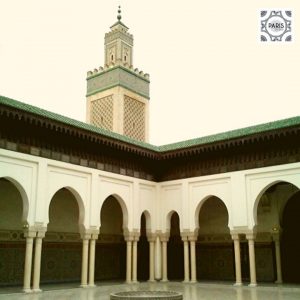
The French government build la Grande Mosque of Paris in 1922 with its 33 meter minaret (district 5), as a tribute to the 100,000 Muslims who died serving under the French colors under World War I. The mosque recalls the grand mosque of Fez in Morocco while the inner court recalls that of Granada’s Alhambra, Spain. In this period, we can include les Folies Bergères Theater near the shopping center Les Galeries Lafayette and the Porte Dorée immigration Museum.
Postwar period (1953 – 1974)
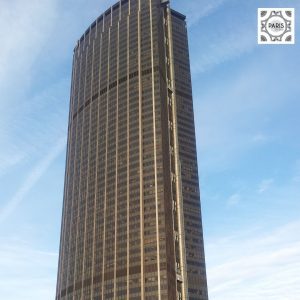
The Montparnasse Tower is a 210-metre office skyscraper located in the district 15 of Paris. Constructed from 1969 to 1973, it was the tallest skyscraper in France until 2011 when it was surpassed by the 231-metre (758 ft) Tour First in the business district of Paris La Défense. In this period, we can include Le Parc des Princes Stadium and the Centre Georges Pompidou or also called Beaubourg, our national modern art museum in Les Halles district.
Postmodernism and the 1980s

The park de la Villette was entrusted in 1983 to Bernard Tschumi, French architect of Swiss origin. The essential characteristic of this Parisian park is to not break the perspective of the north to south. A cinematic walk reveals themed gardens, playgrounds, theaters where nature is staged. A rectilinear gallery covered with a wave-shaped roof connects the north and the south. In this period, we can include la Promenade Plantée from Bastille to Bois de Vincennes and la Grande Arche de la Défense.
Current tendencies Paris Architecture (1991 – 2013)

Established in Paris since 1994, the Cartier Foundation is located in the building designed by the architect Jean Nouvel, with transparency and reflections. In this unique setting, creations, exhibitions and meetings come to life. The Cartier Foundation is a singular example of corporate sponsorship in France for Contemporary Art. It is now relocating closer to the Louvre museum. It is marking a new chapter in its history and reinforcing its presence at the heart of Paris’s major cultural institutions. In this period, we can include : the department store BHV for men in the Marais, Shopping Center Bercy Village, Docks en Seine la Cité de la mode et du Design on the Seine River, la Philharmonie de Paris, Quai Branly Jacques Chirac Museum, Les Halles de Paris, Wagram Hotel, Publicis Corporate building on the Champs Elysées avenue, chapelle Notre Dame de la Pentecôte, the Wall of Peace, and more… to come.
Paris Architecture
From Medieval Times, French rulers moved from Île de la cité to the Louvre, than to Versailles in the meantime already swallowed up by the greater Paris. The architecture in the inner city is fabulous and the suburb or Grand Paris offer too amazing buildings and institutions that keep Paris bigger and bigger.
We recommend to do the Architecture private tour of Paris by car.
Emy,

